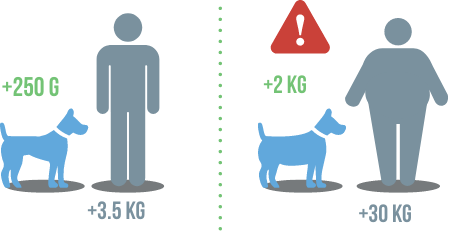
Practical Advice for Feeding Your Neutered Dog

The amount of food given daily must be properly calculated based on multiple factors such as current bodyweight, ideal weight, level of activity etc... Follow the recommendations on the packaging, and speak to your vet for if you have any questions.
Measure the daily amount accurately with a suitable cup or kitchen scales to avoid over or underfeeding. In the long term, overfeeding even by 20g a day could be significant for a small dog!
*Recommended daily ration for a normally active dog fed with VETERINARY HPMⓇ Neutered Dog.

Use a bowl of a suitable size for the daily amount. It has been proven that the bigger the bowl, the more owners tend to feed their dog1.
1. Murphy M, et al. Size of food bowl and scoop affects amount of food owners feed their dogs. J Anim Physiol a Anim Nutr 2012; 96: 237-241
To maintain an ideal bodyweight throughout their life and avoid compromising the efforts you are making with their diet, it is key to make sure that everybody in the family follows the same rules. Same applies to anyone else looking after the dog, such as dog sitters or dog walkers. Watch out for children giving leftovers to their beloved dog!
Keep a close eye on any change in your dog's weight after neutering: weigh them at least twice a month. It is always easier to correct the situation at an early stage.
Weighing should always be done around the same time and on the same set of scales. The scales must be sensitive enough to measure a variation of 100g for a small dog. Do not hesitate to ask your vet practice if you can bring your dog regularly to the clinic to be weighed. If your dog's weight is increasing, even slowly but surely, ask your vet or vet nurse for some nutritional advice.
Remember, it's all relative! A small dog gaining 250g is the equivalent to a 70kg human putting on 3.5kg! 
Also, a 2kg increase in bodyweight for a small dog represents a 40% increase of their overall weight! This would also mean that the dog has reached morbid obesity and could face life-threatening health issues.
.png)
.png)

Lack of exercise can lead to weight gain. To keep your dog at their ideal weight, it is important to make sure they exercise every day. And remember, just opening the door to the garden does not mean that they will get the right amount of exercise!
The amount of daily exercise depends on the age, breed and physical condition of your dog. If unsure, ask your vet or vet nurse!
Simply reducing the amount of food is not always a good idea and could lead to frustration for your dog or even deficiencies in some nutrients! Therefore, if you think your dog is overweight, it is best to speak to your vet or vet nurse first. They might advise on a weight loss diet instead, at least until the optimal body weight is reached. Diets specially formulated for neutered animals should be used immediately after neutering.
![Calque 2.png]() A full range of products specially formulated with your dog's health in mind.
A full range of products specially formulated with your dog's health in mind.





 A full range of products specially formulated with your dog's health in mind.
A full range of products specially formulated with your dog's health in mind.